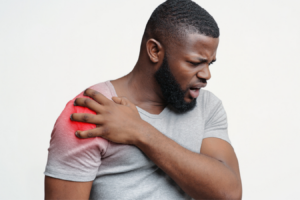 Shoulder pain is extremely common. In fact, the National Institutes of Health estimates up to 70% of people will experience shoulder pain in their lifetime. Furthermore, rotator cuff tears are among the most common types of shoulder injuries, affecting approximately 40% of the population who are less than age 60. Interestingly, many people with a torn rotator cuff are asymptomatic, meaning they don’t have any symptoms. Therefore, they may not even know they have one.
Shoulder pain is extremely common. In fact, the National Institutes of Health estimates up to 70% of people will experience shoulder pain in their lifetime. Furthermore, rotator cuff tears are among the most common types of shoulder injuries, affecting approximately 40% of the population who are less than age 60. Interestingly, many people with a torn rotator cuff are asymptomatic, meaning they don’t have any symptoms. Therefore, they may not even know they have one.
Do you have a rotator cuff tear or injury? Before we discuss symptoms and treatment, we must first understand the basics. Like, what exactly is the rotator cuff? How does it work? And what happens when a rotator cuff is torn or injured?
What is the rotator cuff?
The shoulder is one of the largest and most complex joints in the human body, providing a wide range of motion. The shoulder joint is formed where the upper arm bone (known as the humorous) fits into the shoulder blade (scapula), essentially forming a ball and socket. Furthermore, the shoulder moves with a combination of muscles and tendons (strong bands of tissue) around the joint and shoulder blade. This group of muscles and tendons is known as the rotator cuff. Essentially, the rotator cuff surrounds the shoulder to help keep the ‘ball’ in place within the ‘socket’. Additionally, it provides support and stability for the shoulder, allowing it to rotate safely.
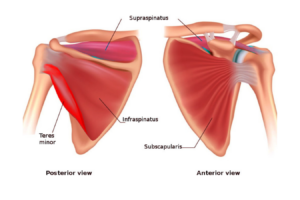 What is the rotator cuff made up of? And how does it work?
What is the rotator cuff made up of? And how does it work?
So, we’ve already discussed that the rotator cuff is made up of a group of muscles and tendons. But, let’s talk more about its individual parts, as well as how they work together to help the shoulder with movement and stability. Basically, shoulder motion is a combination of movement between the shoulder blade, chest wall (scapulothoracic joint), and the shoulder joint itself (glenohumeral joint). The rotator cuff is essential for shoulder joint (glenohumeral) motion and consists of four muscles:
Subscapularis
The subscapularis muscle is responsible for the internal rotation of the arm and shoulder. For example, as a baseball player throws a ball, his arm descends towards his torso. So, the subscapularis is used in that motion of pulling towards the midsection.
Supraspinatus
The supraspinatus muscle helps with abduction or moving your arm away from your body. To illustrate, a swimmer who specializes in the butterfly stroke has to keep his or her arms straight out from their body and pull backward. The supraspinatus is engaged when holding the arms out from the body.
 Infraspinatus & Teres minor
Infraspinatus & Teres minor
The infraspinatus muscle allows you to externally rotate your arm within the shoulder socket. The teres minor is a small muscle that helps rotate your arm. Both of these muscles are used in the abduction (moving away from the center of the body) and lateral rotation (rotating away from the center of the body) of the shoulder. For instance, a tennis player uses these muscles when serving the ball, as they help to lift the arm and rotate from the elbow.
Again, tendons then attach these muscles to bones, wrapping around the head of the upper arm bone. This forms the rotator cuff, which helps keep the arm in the shoulder socket.
Who is at risk of a rotator cuff tear or injury?
If any of the individual muscles mentioned above tear it could be considered a rotator cuff injury. Unfortunately, the size and complexity of the rotator cuff make it highly susceptible to injury. That said, rotator cuff tears mostly affect older people and athletes.
Job-Related Rotator Cuff Injuries
As we get older our tendons and muscles deteriorate easily allowing for injury. Namely, repetitive motion and stress on the shoulder can cause these muscles to weaken. For example, if you have a more labor-intensive job and/or one that requires repetitive motion, like carpentry, window washing, construction, etc., your rotator cuff may experience extreme wear and tear. Therefore, you may be more prone to rotator cuff tears and injuries.
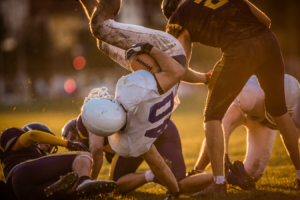 Rotator Cuff Injuries in Athletes
Rotator Cuff Injuries in Athletes
Additionally, athletes who participate in overhead and contact sports like baseball, volleyball, tennis, swimming, football, wrestling, and rugby are more likely to experience a rotator cuff injury. These athletes put hard, repetitive stress on their shoulders. As a result, they may experience a degenerative tear, acute tear, or an injury involving a mixture of the two in their rotator cuff.
Degenerative Tears vs. Acute Tears
To clarify, a degenerative tear is caused by repetitive use, while an acute tear is caused by a sudden hit or fall. Tennis, baseball, and volleyball players are more inclined to experience a degenerative tear with constant, repetitive serving or throwing. However, football and rugby players are more likely to experience an acute tear, as they repetitively collide with one another. Furthermore, acute tears can also stem from a broken collar bone or a shoulder dislocation. Again, these are more commonly seen in football and rugby players.
I hurt my shoulder. Now what?
First, if you have any form of undiagnosed shoulder pain, it is important to consult an expert as soon as possible to get an accurate diagnosis and treatment plan.
During your first appointment, a physician will typically examine the shoulder and order an x-ray and MRI to diagnose your injury. Then, if your injury is in fact a rotator cuff tear, they will determine if it’s a complete tear (detached from the humerus completely) or a partial tear (only partially detached from the humerus).
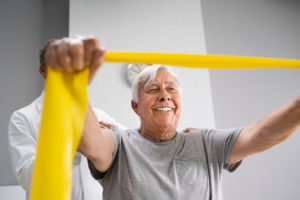 Conservative (Nonsurgical) Treatment for Rotator Cuff Injuries
Conservative (Nonsurgical) Treatment for Rotator Cuff Injuries
Conservative treatment may be considered before surgery, especially for older patients who experienced tears as a result of everyday use and/or muscle degeneration. For example, the provider might suggest anti-inflammatories first, followed by physical therapy and rest from repetitive or usual activities. Physical therapy for rotator cuff injuries typically focuses on strengthening the muscles around the tear and bringing back range of motion.
However, if this initial plan does not help, the physician may give a cortisone injection, which is simply a powerful anti-inflammatory that should calm the pain long enough to make physical therapy tolerable. If all else fails, surgery may be considered.
Surgical Treatment for Rotator Cuff Injuries
Interestingly, we have a saying for athletes who experience acute tears: “The more force needed to produce a tear, the greater the chances the tear can be surgically repaired.” To explain, a healthy tendon requires a lot of force to tear it. So, surgeons can often repair a tear resulting from a major injury if you don’t delay surgery for more than a few weeks.
Athletes are typically very healthy people with strong muscles and plenty of oxygen flowing through their bodies. So for their muscles to tear, a great deal of force must have been applied. That amount of force will create a larger tear. Therefore, surgery is usually a better option in this situation. It gives them a greater shot at returning to and excelling in their sport, as well as increased quality of life later on.
Surgery for a rotator cuff tear involves reattaching the tendon to the humerus. Additionally, the surgery requires months of recovery. After surgery and recovery, patients typically regain complete function of their shoulder and experience long-lasting positive effects from the repair.
It is important to note that people who experience a rotator cuff injury, are prone to having another – and often do. So, if you’ve had a rotator cuff injury in the past, please use extreme caution until your doctor tells you otherwise.
When should I talk to a doctor?
As always, if you have any form of undiagnosed chronic and/or severe pain it is important to see an expert ASAP to determine the root cause of the pain. So, consult with a physician as soon as possible to ensure you receive a proper diagnosis and treatment plan.
Advanced Ortho and Spine Can Help.
At Advanced Ortho and Spine (AOS), we’ve cared for numerous patients with rotator cuff injuries. Most are able to get back to living their best lives with only conservative treatment. Dr. Christopher Cook and Dr.Erik Maryniw at AOS all specialize in treating various orthopaedic conditions, including rotator cuff tears and injuries. Please request an appointment online or call us at 615.885.0200 to schedule yours today.
Disclaimer
This blog provides general information and discussions about health and related subjects. The information and other content provided in this blog, or in any linked materials, are not intended and should not be construed as medical advice, nor is the information a substitute for professional medical expertise or treatment.
If you or any other person has a medical concern, you should consult with your healthcare provider or seek other professional medical treatment. Never disregard professional medical advice or delay in seeking it because of something read on this blog or in any linked materials. If you think you may have a medical emergency, call your doctor or emergency services immediately.
The opinions and views expressed on this blog and website have no relation to those of any academic, hospital, health practice, or other institution.
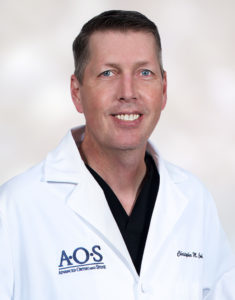 Dr. Christopher Cook is a Board-Certified Orthopaedic Surgeon and Sports Medicine & Joint Replacement Specialist at Advanced Ortho and Spine. He provides a full spectrum of Joint Replacement, Sports Medicine, and Shoulder & Upper Extremity services. Contact us today for more information or to request an appointment.
Dr. Christopher Cook is a Board-Certified Orthopaedic Surgeon and Sports Medicine & Joint Replacement Specialist at Advanced Ortho and Spine. He provides a full spectrum of Joint Replacement, Sports Medicine, and Shoulder & Upper Extremity services. Contact us today for more information or to request an appointment.
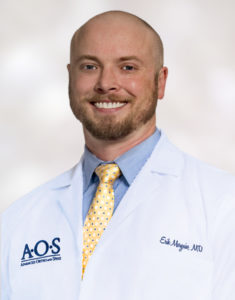 Dr. Erik Maryniw is a Board-Certified Hand and Upper Extremity Orthopaedic Surgeon at Advanced Ortho and Spine. He provides a full spectrum of Orthopaedic care and Microvascular Surgery from the hand to the shoulder. Contact us today for more information or to request an appointment.
Dr. Erik Maryniw is a Board-Certified Hand and Upper Extremity Orthopaedic Surgeon at Advanced Ortho and Spine. He provides a full spectrum of Orthopaedic care and Microvascular Surgery from the hand to the shoulder. Contact us today for more information or to request an appointment.
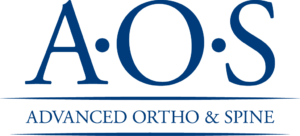
With two locations near Nashville in Mt. Juliet and Hermitage, Advanced Ortho and Spine provides patients with high-quality, personalized care while advancing orthopaedic excellence. Contact us today to learn more or to schedule your appointment.
Disclaimer: This blog provides general information and discussions about health and related subjects. The information and other content provided in this blog, or in any linked materials, are not intended and should not be construed as medical advice, nor is the information a substitute for professional medical expertise or treatment.If you or any other person has a medical concern, you should consult with your healthcare provider or seek other professional medical treatment. Never disregard professional medical advice or delay in seeking it because of something read on this blog or in any linked materials. If you think you may have a medical emergency, call your doctor or emergency services immediately.
The opinions and views expressed on this blog and website have no relation to those of any academic, hospital, health practice, or other institution.

